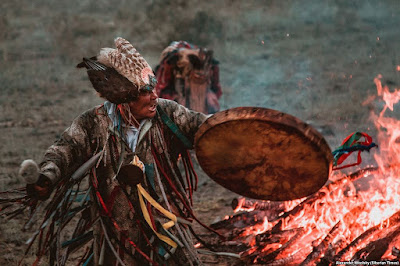This hidden knowledge of the ages isn't something you can afford to ignore. It's folklore and science and culture all wrapped into one. This is religion.
 |
| Tuvan shaman, Alexander Nikolsky |
In our present day, there's a rift perceived between religion and science, two areas of life set at odds against each other. To many, religion is something you do in private for vaguely "spiritual" reasons or to "be a better person". Science (like its aft-facing counterpart history) is seen as a proper area of learning and study, where useful knowledge can be obtained.
With that mindset, it's easy to forget about religion. In the world of Signs in the Wilderness, everyone is religious, in one way or another.
- Religion is ancestral. It's been passed down from generation to generation, a tangible link to the ancestors who came before you. You might not own anything your great-great-grandmother once had, but you can still practice her religion and know her story.
- Religion is cultural. If all our people do things the same way, that way identifies us as a people and shows who belongs to our group.
- Religion is political. When religion determines identity and prescribes conduct, religious authority becomes political power.
- Religion is knowledge. The ancestors did things this way for a reason. We've lost a lot since the apocalypse; following their ancient rule may save us from dangers in ways we don't even understand.
Let's look closer at those four points:
- Your grandfather's musket comes with a code of honor and a story of how it was used.
- Conflicts in the past can spill over into the present, especially if they're still talked about in the religion.
- Likewise, old alliances can be rekindled if both sides remember the old stories.
- If you want to fit in, you're going to need to show that you know the signs and the stories.
- Breaking the religious rules gets you exiled from the group (or worse).
- If you're of the wrong religion, you're not welcome here.
- A revered prophet speaks, and the people believe. The one who bears the signs of the prophecy will be given great power.
- A leader breaks a taboo or opposes the will of the ancestors, and the people will not allow them to remain in power.
- Religious support strengthens a regime, so a wise conqueror will go to the priests for confirmation of their right to rule.
4. Hidden knowledge can be found in religion.
- Throwing salt over your shoulder might actually ward away bad luck.
- Hanging mirrors around a graveyard might actually keep the spirits of the dead out of the village.
- There might actually be a being watching from the mountain, and the local religion teaches how to avoid angering it.
 |
| W. D. McIntyre |
Fifty-odd years ago, the world nearly came to an end. Darkness covered the sun, cold winds blew down from the north, and there was hunger and war and death.
Beliefs were tested. Many didn't survive.
Think of difficult times as a scientific experiment. Previous experimenters had come to various conclusions, but now a larger experiment was being run, testing the foundational beliefs of the world. Everyone had a hypothesis, a theory of their own about how the world truly worked, and everyone was about to see the result. Some beliefs turned out to be right, gaining support from the experiment. Some beliefs turned out to be wrong, leading some to change to better-supported theories while others dug in their heels.
The old ways have been shaken, challenged, and often broken by the apocalypse. Great rifts in society have opened up, room for conflicts that can engulf everything, including unwary outsiders. People today fall into a few major groupings:
- Those who hold even tighter to the old ways. They're deeply conservative, trying to protect their people from any dangerous innovations.
- Followers of new religions. They are certain that the old ways led to destruction. They believe in their religion's promise of a new world. It's likely that they follow a teacher or a prophet.
- Victims of the ongoing social trauma of the apocalypse. They're stunned, in mourning, part of a culture that has lost its purpose.
New religions have also shown up since the apocalypse. For many people, it seemed like none of the theories explained what had happened. That's when to sit down and think and come up with a new theory, a new way to understand the world and figure out what to do next.
 |
| Santeria, Mick Palumbo |
If religious movements were purely scientific, there'd be a lot less resistance to changing from one to another. (Though there'd still be some resistance — scientists are as stubborn as anyone else.) But when religion isn't just about knowledge, but also political power and cultural identity and ties to one's ancestors, changing religions undermines all of society.
A few topics I'd like to get to in future posts:
- rolling up a random human religion
- the fracturing of the elven religion after the loss of the great temple
- goblin shamans: spirits and pharmacology
- giants who converted to the old orthodox elven faith
- playing as a missionary character
I love how nerly all your posts have both the game material and something worthwhile to say about it, applicable to both your setting and in general.
ReplyDeleteThatt's a good way to handle religion.
ReplyDeleteI have published an excerpt of this on my blog (with linked attribution).
ReplyDelete"Everyone Is Religious"
https://www.xenograg.com/912/web-excerpt/everyone-is-religious